From Syria to Sweden: Eiad´s perilous voyage across the Mediterranean
Eiad’s wife did not want him to embark on the perilous journey across the Mediterranean Sea to safety in Europe, but Eiad believed it was their only option. They had tried to build a new life in Egypt, but after two years in the country, Eiad realized he would not be able to provide a good future for his young children there. “Life wasn’t very good in Egypt”, he explains. In spite of his wife’s protests, Eiad decided to risk his life in a rickety boat sailing from Egypt to Italy. His wife and children returned to Damascus. “I was more worried about the kids”, he says. “I thought that if my life will finish, it will finish anyway – in Egypt, in the sea, wherever.”
After one and a half months of searching, he made contact with a human smuggler. The price for getting to Europe: 2,500 dollars. “We went in a group so it would be cheaper. The safest way to travel to Europe is through Turkey but it’s much more expensive. Sometimes, it can cost more than 8000 dollars per person” says Eiad. He describes the five-day boat journey to Italy with more than 300 others as “hell”- people were thrown into the boat and the smugglers did not care if they fell into the water. “If they had animals with them, they would take better care of them because they’re worth more to them”, says Eiad. Still, there was a sense of solidarity between passengers. Eiad recalls how two people almost fell off the boat in their sleep but were caught by the other passengers.
After reaching the shores of Italy, Eiad headed towards Northern Europe and arrived in Sweden on 12 October 2014. Coming here was a great relief, but life as a refugee has its daily struggles. “I miss my family” says Eiad, explaining how he had to adjust to his new life at the asylum-seeker reception centre in Farsta, Stockholm. “Starting over is not easy and leaving your country without your family… it’s hard. A lot of people who came here didn’t want to leave their lives behind in Syria. But it is impossible to give them back the same life here…They are forced to change” he says sadly.
For 36-year-old Eiad, a former shop and restaurant owner, living a slower paced life at the reception centre is a challenge. He often plays cards with some of the other people at the centre to make time pass faster and sometimes he also plays football. “But I have a problem with my back so I can’t do too much sport.” He believes life moves slower in Sweden. “In Syria, we do everything fast. A lot of Arabs find this very frustrating because we are always in a hurry” says Eiad with a laugh,
“We want things to happen faster, and we want to be reunited with our families sooner.”
Eiad says he has not started his life in Sweden yet, not without his family. “Your mind is not clear, it’s with your family, your kids, and you’re waiting to see them.” But despite the continuing concerns for his family, Eiad is hopeful for the future. “I want to finish my studies or work and study at the same time. I don’t like to sit still.” He hopes to use the skills he acquired as a restaurant owner in Syria to start a small restaurant in Sweden, serving Syrian food.
Eiad’s application for asylum has just been approved and he is waiting to be reunited with his wife and two sons, who are still in Syria. “My children are very excited about coming to Sweden”, says Eiad with a big smile. “My wife is worried because she doesn’t know anyone here and it’s strange for her. But I think she’s going to like it. She is an English teacher” he says proudly.
Page 32 of 33
-
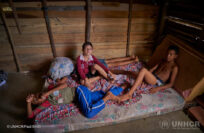
Denmark’s emergency funding offers lifeline to Venezuelans forced to leave their country
01.11.2017USD 500,000 from Denmark’s Emergency Reserve Fund will support UNHCR’s work to help the increasing numbers of Venezuelans, fleeing violence, insecurity and lack of basic services.
-
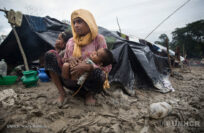
Denmark supports UNHCR with USD 6.3 million to meet critical needs of Rohingya refugees
30.10.2017More Rohingya refugees arrive in Bangladesh every day. The substantial donation from Denmark will support UNHCR’s efforts to develop a new site for the new arrivals to live.
-
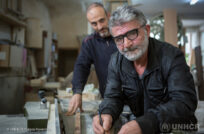
UNHCR calls for the EU relocation scheme to continue
27.09.2017UNHCR, the UN Refugee Agency, has urged EU Member States to promptly relocate all asylum-seekers eligible under the EU’s emergency relocation scheme and for it to continue beyond the two years originally planned.
-
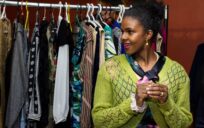
Ethiopian refugee shares her passion for dresses with Lithuanian women
01.09.2017Eskedar Maštavičienė was relocated to Lithuania from Malta in 2007. Now, 10 years later, she lives in Vilnius with her husband and three children and considers the country her home. She has started a charity to help local underprivileged women.
-
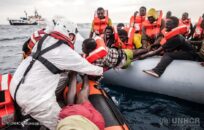
Journeys to Europe more diverse, but all high risk for refugees and migrants
21.08.2017Latest data on refugees and migrants entering and crossing Europe via the Mediterranean and Western Balkans routes.
-
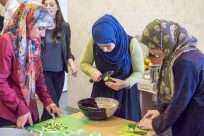
Volunteers give refugees a taste of life in Lithuania
26.07.2017Aktyvus jaunimas (Active Youth), a youth group based in Vilnius, is trying to give newly arrived refugees a taste of their new home at the reception centre in Rukla, near Kaunas, Lithuania‘s second largest city.
-
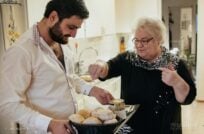
Saving lives and welcoming refugees, a responsibility of everyone
22.06.2017World Refugee Day is also a good time for everyone to contemplate what each of us can do to overcome indifference or fear and embrace the idea of inclusion, and welcome refugees into our own communities.
-

War, violence, persecution push displacement to new unprecedented high
19.06.2017UNHCR’s new Global Trends report says that at the end of 2016 there were 65.6 million people forcibly displaced worldwide.
-
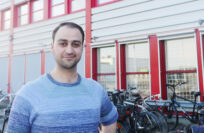
How do you say servo-valve in Swedish? Basel’s phrasebook helps refugee engineers
18.05.2017Conductivity, servo-valves and stator cores – even if you are fluent in a language you might not know these words. Basel Taleb, a refugee and electrical engineer built a tool to help himself – and other foreign engineers – to understand the Swedish energy sector.
-
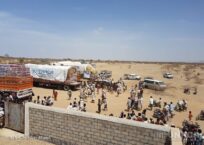
‘Leaving no one behind’: Norway’s unearmarked core support to the UNHCR saves refugees
01.05.2017In 2016, Norway became the largest donor to the United Nations High Commissioner for Refugees (UNHCR) per capita, the seventh largest donor country to UNHCR in total and the fourth largest donor of unearmarked support.
